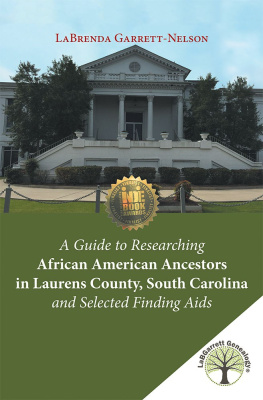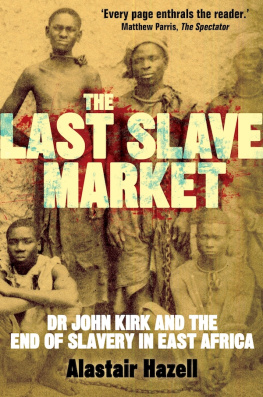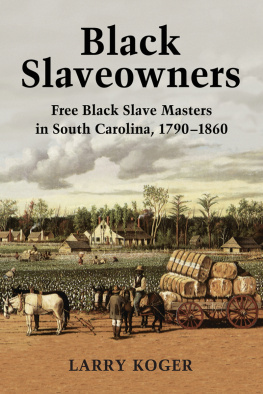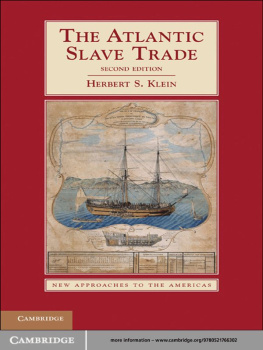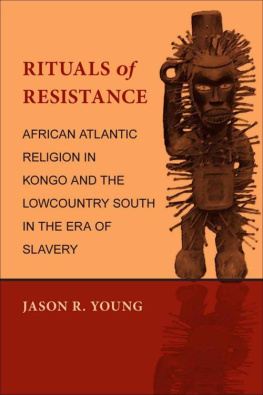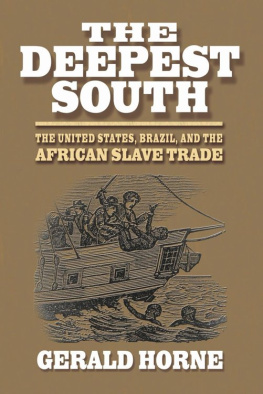2011 University of South Carolina
Cloth edition published by the University of South Carolina Press, 2011
Paperback edition published by the University of South Carolina Press, 2012
Ebook edition published in Columbia, South Carolina,
by the University of South Carolina Press, 2012
www.sc.edu/uscpress
21 20 19 18 17 16 15 14 13 12 10 9 8 7 6 5 4 3 2 1
The Library of Congress has cataloged the cloth edition as follows:
Lowther, Kevin.
The African American odyssey of John Kizell : a South Carolina slave returns to fight the slave trade in his African homeland / by Kevin G. Lowther ; foreword by Joseph Opala.
p. cm.
Includes bibliographical references and index.
ISBN 978-1-57003-960-7 (cloth : alk. paper)
1. Kizell, John, ca. 1760ca. 1830. 2. African AmericansColonizationSierra Leone. 3. Sierra LeoneHistoryTo 1896. 4. Slave tradeSierra LeoneHistory. 5. African American loyalistsBiography. 6. SlavesSouth CarolinaBiography. 7. Sierra Leone Company. I. Title.
DT516.72.K49L68 2011
306.3'62092--dc22
[B]
2011005929
ISBN 978-1-61117-133-4 (ebook)
FOREWORD
John Kizell's life was filled with danger and determination. Born in the Sierra Leone region of West Africa about 1760, he was torn from his family as a boy and taken on the Middle Passage to slavery in South Carolina. When the American Revolutionary War erupted, he took his chance, like many other slaves, and served in the British army, hoping that his new masters would reward his military service with freedom. When the British lost the war, Kizell was lucky to be among the three thousand black loyalist soldiers and dependents the British evacuated to Nova Scotia in 1783.
But his struggles had only just begun. The white loyalists taking refuge in Canada at the same time did their best to maintain the racial hierarchy that had served them so well in America, and Kizell and his fellow former slaves had new battles to fight. Canada's climate was bitter for them in more ways than onehaving fought a hot war in America to gain their freedom, they now had to fight a cold war in Nova Scotia just to retain it.
By the time John Kizell was just thirty years old, he had already survived four episodes brimming with dangerthe slave trade in Africa, bondage in America, the battlefields of the American Revolution, and the continuing struggle for freedom in Canada. These experiences alone would have made his life a remarkable saga, but his story does not end there. In 1792 Kizell joined the nearly twelve hundred black loyalistsor Nova Scotianswho left Canada for Sierra Leone. By a strange twist of fate, he was returning to his home region in Africa to help found the colony of Freetown on the site of an earlier settlement for freed slaves that was destroyed just three years before. Kizell and his fellow settlers had to contend with the African king who burned the first colony and with the British merchants at the Bance Island slave castle just seventeen miles upriver. For decades their colony of freed slaves had to coexist with the Atlantic slave trade still going on around their frail settlement in every direction.
Kizell and the other Nova Scotian settlers also had to contend with the British philanthropists of the Sierra Leone Company who sponsored their colony. Their benefactors were well-meaning but also painfully paternalistic; and some of the white merchants they sent out from England to help promote the colony's development were openly resentful of the settlers' economic ambitions. The British officials who ran the colony were also hostile to the settlers' American-style individualism. These former slaves may have fought for the British to gain their freedom, but their political instincts, it seems, were still American, and they bristled when their British benefactors made laws for them without their consent. Kizell's response was to leave Freetown and spend much of his time trading and farming south of the colony in the Sherbro area, where he originally came from. He became a man of two worlds and not fully comfortable in either. He resented the white man's paternalism, but he also raged at his own people's participation in the slave trade. He confronted the African kings repeatedly and sent detailed reports on their slaving activities back to the British governor in Freetown.
Yet Kizell's success as a merchant and farmerand the respect he gained from both British officials and local African rulersput him at the center of some important developments of his time. Kizell befriended Paul Cuffe when he sailed his ship Traveller from Philadelphia to Freetown in 1811, bringing black settlers from the United States and trying to establish commercial opportunities for his people on both sides of the Atlantic. And later, when the American Colonization Society sent its first settlers to West Africa in 1820 to establish the Liberia colony, the society turned to Kizell to find the right spot for the settlement. He took these black American pilgrims to his own home area in the Sherbro country, which turned out in the end to be a disastrous mistake that plunged him into bitter controversy. But when Liberia emerged a few years later, it was located not far south of the place Kizell had first recommended.
Kevin Lowther brings John Kizell's tumultuous story back to life. This is no small feat given that the records of Kizell's existence are sparse, to say the least, and scattered across three continents. But Lowther scoured libraries and archives for official documents, newspaper accounts, and Kizell's few remaining letters and dispatches; and he visited the sites of his subject's exploits, including his former haunts in Nova Scotia. Lowther also has the advantage of having served as a Peace Corps volunteer in Sierra Leone during the 1960s, so he knows the language, culture, and character of the people in the place Kizell came from before he was enslavedand the place he returned to after he gained his freedom. But Lowther's greatest accomplishment with this book is the way he weaves the scattered sources on Kizell together with the myriad details of time and place to produce a seamless narrative that vividly reflects all the danger, passion, turmoil, and commitment of John Kizell's long and eventful life.
Many Americans are only now learning about the black loyalists and their own struggle for independence during the American Revolutionary War and afterward in Canada and Sierra Leone. Two excellent books on this subject appeared in 2005Adam Hochschild's Bury the Chains and Simon Schama's Rough Crossings. Both these works allow the Africansand not just the British and Americansto speak for themselves, but like so many earlier retellings of this tale, they present the black loyalist saga from a group perspective. The advantage of Lowther's narrative is that it tells the story through the eyes of just one interesting and determined man. Looking through John Kizell's eyes, we can see the many complex calculations the black loyalists had to make when dealing with their slave masters in the North American colonies, British officers in the Revolutionary War, white loyalist refugees in Canada, company officials in Freetown, and African chiefs in Sierra Leone. Seeing these situations through Kizell's eyes helps to clarify the politics of the time and brings into sharp focus the many difficult challenges the black loyalists faced in their long journey to freedom.



